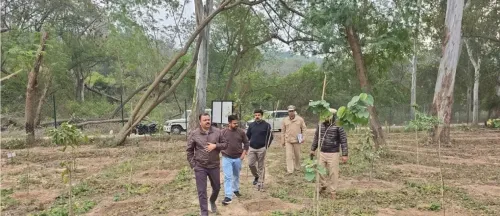Karnataka: Environmentalist Tulsi Gowda, Padma Shri Recipient, Passes Away

Karwar (Karnataka), Dec 16 (NationPress) Tulsi Gowda, a respected recipient of the Padma Shri award and popularly known as 'Vruksha Maate' (Mother of Trees), passed away at the age of 86 at her home in Honnalli village, situated in Karwar district of Karnataka. She had been afflicted with various age-related health issues.
Belonging to the Halakki tribal community, Tulsi was celebrated for her remarkable efforts in planting and nurturing millions of trees in her area, effectively transforming her surroundings into a thriving forest.
Her life was devoted to environmental advocacy, where she invested over 60 years in promoting the importance of environmental conservation.
In acknowledgment of her invaluable contributions, Dharwad Agricultural University awarded her an honorary doctorate. She leaves behind two children and four grandchildren.
In 2021, the Government of India recognized her unwavering commitment to environmentalism by bestowing upon her the prestigious Padma Shri award.
Tulsi Gowda was born in 1944 in Honnalli village to her parents Narayana and Neeli, and she was named after the revered plant Tulsi.
Having grown up surrounded by nature, she developed a profound affinity for the environment, particularly with plants and trees, by the age of 12.
Local advocates for the environment often referred to her as a living 'encyclopedia of forests'.
Tulsi possessed comprehensive knowledge about a diverse array of plants, trees, and vines native to forest ecosystems.
She also excelled in cultivating forests on flat terrains.
Widely respected as an expert on over 300 varieties of indigenous flora, Tulsi was known to plant and care for more than 30,000 saplings annually.
Her remarkable achievement includes having planted and nurtured hundreds of thousands of trees throughout her lifetime.
After the untimely death of her husband, she joined the Forest Department as a daily wage worker to provide for her two children.
Throughout this period, she continued to care for the plants and, without expecting any compensation or directives, wholeheartedly devoted herself to the mission of afforestation.
Moreover, she collected seeds from various wild plants found on the edges of the forest, nurtured them into saplings, and quietly spearheaded a green revolution by planting them in the forests.










